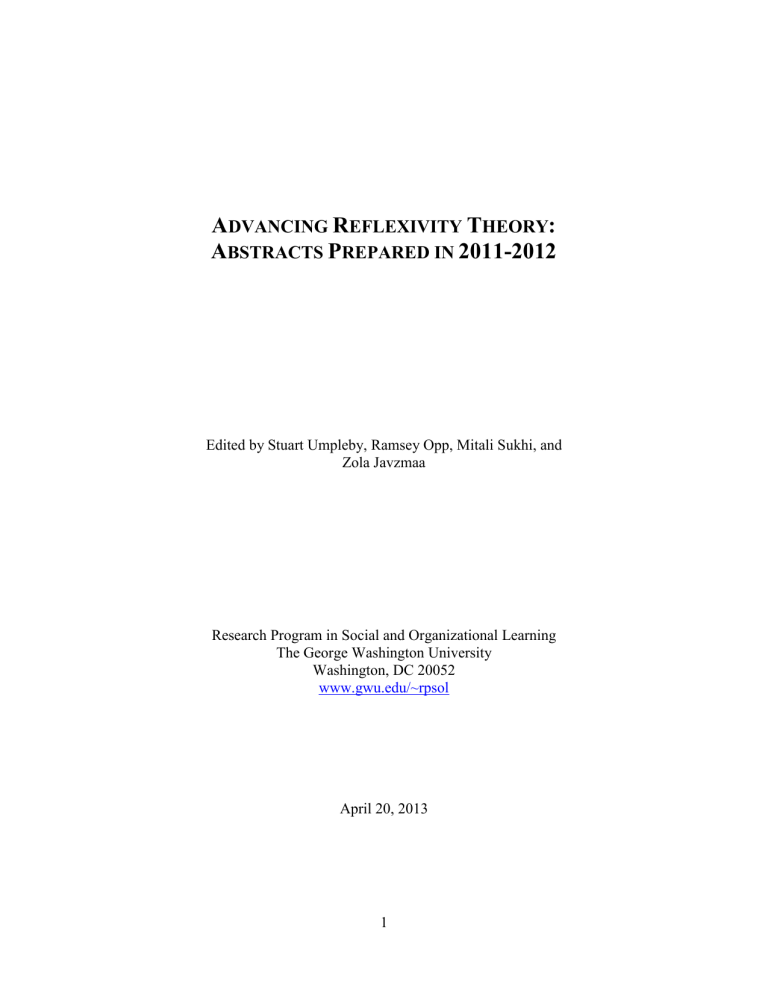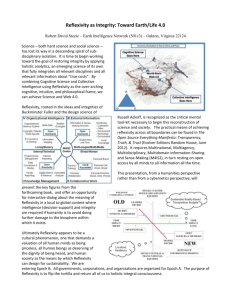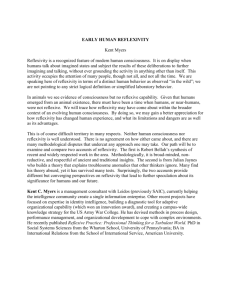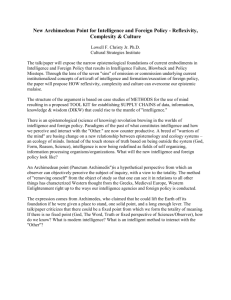Abstracts Prepared in 2011-2012 - The George Washington University

A
DVANCING
R
EFLEXIVITY
T
HEORY
:
A
BSTRACTS
P
REPARED IN
2011-2012
Edited by Stuart Umpleby, Ramsey Opp, Mitali Sukhi, and
Zola Javzmaa
Research Program in Social and Organizational Learning
The George Washington University
Washington, DC 20052 www.gwu.edu/~rpsol
April 20, 2013
1
PREFACE
The Research Program in Social and Organizational Learning at The George Washington
University hosts visiting professors for periods of several months or an academic year. In the
2010-2011 academic year, the Research Program hosted seven visiting scholars. Two were
Fulbright Scholars. One was funded by the Faculty Development Fellowship Program of the
Open Society Foundation. Some of these abstracts were prepared by professors and visiting scholars associated with the Research Program. Others were prepared for panel sessions at conferences on cybernetics or systems science.
The first three papers were presented at the Faculty Research Forum of the Washington
Consortium of Schools of Business in January 2012. Papers 4 to 8 were presented at the semiannual meeting of the Washington Academy of Sciences, March 31 to April 1, 2012. Papers
9, 10 and 11 were prepared for a symposium on Country Development at the European Meeting on Cybernetics and Systems Research, held in Vienna, Austria, April 10-13, 2012. Papers 12 to
17 were presented at the annual meeting of the American Society for Cybernetics held in
Asilomar, CA, July 9-13, 2012. Paper 18 was a presentation of research done at GWU for a doctoral dissertation in Romania.
Stuart Umpleby, Director
Research Program in Social and
Organizational Learning
2
Table of Contents
1.
Nadia Krylova
The American Dream of Tennessee Williams: the Social Dimension of Williams’s Drama ______________________________5
2.
Ahmet Emre Demirci
Cross-Cultural Differences in Entrepreneurial Tendencies __________________6
3.
Stuart Umpleby
Conceptions of Complexity and Implications for Economics _________________7
4.
Kent Myers
Experiments in Reflexive Inquiry ______________________________________8
5.
James R. Simms
Advances in Living Systems Science ____________________________________9
6.
Lowell F. Christy Jr.
A New Archimedean Point for Intelligence and Foreign Policy: Reflexivity, Complexity and Culture _________________10
7.
Michael Lissack
Representations vs. Compressions____________________________________ 11
8.
Ia Natsvlishvili
Peculiarities of Public and Entrepreneurial
Attitudes in Post Soviet Georgia ______________________________________12
9.
Natalia Guseva
Cross-Cultural Synergy as a Management Innovation for Increasing Multinational Companies’ Competitiveness ________________13
10.
Tatiana Medvedeva
Applying a Method of Extended Systems
Analysis to Country Development _____________________________________14
11.
Stuart Umpleby
Graduate Programs for Developing Countries __________________________15
12.
Louis H. Kauffman
Reflexivity, Process and Eigenform ___________________________________16
13.
Ranulph Glanville
Reflecting Between Understanding and Acting __________________________17
3
14.
Klaus Krippendorff
Cybernetics of Discourse___________________________________________18
15.
Vladimir Lefebvre
Self-Reflexive Systems______________________________________________19
16.
Fred Steier
Reflexivity, Self-(less)-Reflexivity, and Social Research____________________20
17.
Stuart Umpleby
Obstacles to Reflexivity Theory in Economics ___________________________21
18.
Delia Mateias
Emotional Intelligence in Educational Leadership_______________________22
4
THE AMERICAN DREAM OF TENNESSEE WILLIAMS: THE SOCIAL DIMENSION
OF WILLIAMS’S DRAMA
Nadezhda Krylova
Karelian State Pedagogical Academy
Petrozavodsk, Russia
Anyone’s success in a hierarchical or economic institution depends on the ability to handle various situation and tensions. Students need to develop the ability to confront ambiguous, illdefined situations and interpret what they know creatively. Thus a background in the humanities can be excellent preparation for business, perhaps even better than a technical or business education. This is particularly true of language and literature. This paper shows how dramatic works of Tennessee Williams serve as a clue to understanding the relationship of people to the organizational and corporate world. The analysis of the two major plays – Camino Real and Cat on a Hot Tin Roof - is hoped to prove that modern corporation, however powerful as an institution, cannot maintain its existence without the values of high culture.
5
CROSS-CULTURAL DIFFERENCES IN ENTREPRENEURIAL TENDENCIES
Ahmet Emre Demirci
Faculty of Economics and Administrative Sciences
Anadolu University
Eskisehir, Turkey
Even though entrepreneurship is not new, its popularity is still growing rapidly as a result of a wide range of factors. Removal of the trade barriers, global economic recessions, advancements in information and telecommunication technologies, corporate restructurings, downsizing, mergers and acquisitions are among the major factors that have helped the topic to keep its critical importance. As a result of the above mentioned conditions, entrepreneurship is increasingly catching the attention of academia as well as governments, policy makers, NGOs and other profit or non-profit institutions. Whilst many governments are working on new policies to support entrepreneurship, higher education institutions are constantly launching new and innovative programs, courses and seminars on entrepreneurship. All these efforts have one common goal which is fostering and encouraging entrepreneurial activities and innovation. This paper explores how cultural factors affect the entrepreneurial tendencies of individuals from a cross-cultural context.
6
CONCEPTIONS OF COMPLEXITY AND IMPLICATIONS FOR ECONOMICS
Stuart A. Umpleby
Department of Management
The George Washington University
Washington, DC
Most of science consists of results obtained with rather simple descriptions – small numbers of variables and often linear relations among them. In recent years there has been growing interest in complex systems. There are at least three definitions of complex systems: 1) systems with large numbers of variables and many relationships among them; 2) systems composed of numerous autonomous (usually preprogrammed) actors/ algorithms which interact, producing often unexpected results (i.e., emergence); 3) systems involving knowing participants acting in systems in which they have an interest in the outcome. The term “complexity” can be used to refer to the first category. The terms “self-organizing systems” or “complex adaptive systems” are used for the second category. “Reflexive systems” refers to the third category.
To illustrate these three categories and how they influence the creation of theories, three conceptions of economic theory are described.
7
EXPERIMENTS IN REFLEXIVE INQUIRY
Kent Myers
Associate, Booz Allen Hamilton
We review four iterations of Virtual Systemic Inquiry (VSI), a method that embraces reflexivity.
VSI exploits the free cognitive surplus available through the web and otherwise starts with no rules, just cybernetic principles: openness, variety, interaction, and an orientation to the common good. Conventional methods, while better in many ways, actually don’t score highly against these criteria. We review and contrast four VSI projects in which procedures were varied and products ranged from a published book to a non-convergent, perpetual conversation. We discuss failures and successes and suggest directions for improvement. We conclude by exploring in what ways this method is reflexive and the advantages this can bring to social inquiry and specifically to public intelligence, even as it breaks all the rules.
8
ADVANCES IN LIVING SYSTEMS SCIENCE
James R. Simms
Chair of the Living Systems Analysis Special Integration Group
The International Society for the Systems Sciences jrsimms@juno.com
The concept of a living systems science equivalent to the natural sciences, such as physics and chemistry, has been evolving since the end of World War II. James Miller’s book
Living Systems
(1978) identifies the subjects of the science, classifies the subjects and identifies relationships.
The book Principles of a Quantitative Living Systems Science (1999) identifies the universal phenomena of life, the relations among these phenomena, and measures of these phenomena.
The living systems are at the cell, organ, and organism levels. Advances are being made at the group level. These advances are described in the presentation.
9
A NEW ARCHIMEDEAN POINT FOR INTELLIGENCE AND FOREIGN POLICY:
REFLEXIVITY, COMPLEXITY AND CULTURE
Lowell F. Christy Jr. Ph.D.
Cultural Strategies Institute
Seneca, MD
The paper exposes the narrow epistemological foundations of current embodiments in
Intelligence and Foreign Policy that results in Intelligence Failure, Blowback and Policy
Missteps. Through the lens of the seven "sins" of omission or commission underlying current institutionalized concepts of art/craft of intelligence and formation/execution of foreign policy, the paper will propose HOW reflexivity, complexity and culture can overcome our epistemic malaise.
The structure of the argument is based on case studies of METHODS for the use of mind resulting in a proposed TOOL KIT for establishing SUPPLY CHAINS of data, information, knowledge & wisdom that could rise to the mantle of "intelligence."
There is an epistemological (science of knowing) revolution brewing in the worlds of intelligence and foreign policy. Paradigms of the past of what constitutes intelligence and how we perceive and interact with the "other" are now counter productive. A breed of "warriors of the mind" are basing change on a new relationship between epistemology and ecological systems – an ecology of minds. Instead of the touch stones of truth based on being outside the system (God,
Form, Reason, Science), intelligence is now being redefined as fields of self-organizing, information processing organisms/organizations. What will the new intelligence and foreign policy look like?
An Archimedean point (Punctum Archimedis) is a hypothetical perspective from which an observer can objectively perceive the subject of inquiry, with a view to the totality. The method of "removing oneself" from the object of study so that one can see it in relation to all other things has characterized Western thought from the Greeks, Medieval Europe, the Western
Enlightenment right up to the ways our intelligence agencies and foreign policy is conducted.
The expression comes from Archimedes, who claimed that he could lift the Earth off its foundation if he were given a place to stand, one solid point, and a long enough lever. The paper criticizes the idea that there could be a fixed point from which we form the totality of meaning. If there is no fixed point (God, The Word, Truth or a fixed perspective of Sciences/Observer), how do we know? What is modern intelligence? What is an intelligent method to interact with the
"Other"?
10
REPRESENTATIONS VS. COMPRESSIONS
Michael Lissack
2338 Immokalee Rd #292
Naples, FL 34110 http://lissack.com
Simple models can be many a manager's undoing. Managers are trained to act on simplicity, but that simplicity is opposite to the complexity of the world in which such businesses operate. Efficiency it seems can be the enemy of resilience. And, in our ever changing complex world resilience is often needed to deal with change. Two types of explanatory models are often evoked as the context underlying change. Models based on labels and categories we shall refer to as "representations." More complex models involving stories, multiple algorithms, rules of thumb, questions, ambiguity we shall refer to as "compressions." Both compressions and representations are reductions. But representations are far more reductive than compressions.
Representations can be treated as a set of defined meanings - coherence with regard to a representation is the degree of fidelity between the item in question and the definition of the representation, of the label. By contrast, compressions contain enough degrees of freedom and ambiguity to allow us to make internal predictions so that we may determine our potential actions in the possibility space. Compressions are explanatory via mechanism. Representations are explanatory via category. Category based explanations may be efficient but they are not resilient. Resilience requires: narratives not labels, mechanisms not categories, a focus on experience and not on labels and a need to be aware of when representations work and when they fail. Retrospective explanation based on representation often fails when mistakenly used as a predictive model devoid of context and compression. This paper highlights the risk which occurs when we confuse the evocation of a representation (category inclusion) as the creation of a context of compression (description of mechanism). In the drive for efficiency such substitutions are all too often proclaimed - at our peril.
11
PECULIARITIES OF PUBLIC AND ENTREPRENEURIAL ATTITUDES IN POST
SOVIET GEORGIA: AN EXAMPLE OF REFLEXIVE SYSTEM THINKING
Ia Natsvlishvili
Tbilisi State University
Tbilisi, Georgia
The paper relies on the results of a survey of Georgians’ knowledge and attitudes toward the
European Union carried out by the Swedish International Development Cooperation Agency
(SIDA) and on the results of a survey about public attitudes in Georgia carried out for the
National Democratic Institute for International Affairs (NDI) by the Caucasus Research
Resource Centers (CRRC). The paper uses the results of research on attitudes toward entrepreneurship conducted by the author in Tbilisi, (Georgia). The present paper also reviews the results of research investigating the degree to which entrepreneurial attitudes and abilities relate to an individuals’ intentions towards entrepreneurial behavior. The attitudes of Georgians are unusual in that they have a much stronger orientation toward entrepreneurial activity than do people in the U.S. or other European countries. The article will consider how to explain this finding from the perspective of both equilibrium theory in economics and reflexivity theory.
Georgians consider themselves to be a part of the system called “Europe”. Georgians remain extremely well disposed toward the EU. They are enthusiastic Europhiles but are not naively optimistic that joining Europe would be the answer to all their problems. Different views about the operation of Georgian democracy remain among Georgians but most people acknowledge that Georgian democracy needs improvement. Georgians display an increasingly active view of citizenship, with large numbers believing it is important to criticize government, protest and volunteer. Georgians’ positive attitudes toward the feasibility of becoming self-employed show self-confidence and expectations of success for market oriented economic reforms and social and political stability in Georgia.
12
CROSS-CULTURAL SYNERGY AS A MANAGEMENT INNOVATION FOR
INCREASING MULTINATIONAL COMPANIES’ COMPETITIVENESS
Natalia Guseva
State University – Higher School of Economics
Moscow, Russia
This paper examines the hypothesis that synergy of cross-cultural differences is the key factor for increasing multinational companies’ competitiveness in the process of globalization. The author also considers synergy of cross-cultural differences as a management innovation applied to multi-nationals working in Russia. The author proposes a new approach for dealing with crosscultural differences and for taking advantage of the cultural diversity that is currently common and presents her own vision and managerial recommendations for reaching synergy on four main
French – Russian dichotomies: individualism – collectivism; universalism – particularism; endogenous – exogenous motivation and attitudes towards time.
13
APPLYING A METHOD OF EXTENDED SYSTEMS ANALYSIS TO
COUNTRY DEVELOPMENT
Tatiana Medvedeva
Siberian State University of Transport
Novosibirsk, Russia
The complexity of the problems faced by scientists in the 21st century makes it necessary to rethink many current social theories and research approaches so that they will be able to support full development of the networked, knowledge-based economy and society. There are many intellectual attempts to revamp current theorizing and to improve understanding among social scientists. One of these, which provides a fundamentally new, complex vision of society through the prism of a new understanding of life, is Fritjof Capra’s approach, integrating biological, cognitive and social dimensions on the basis of a theory of complexity.
This paper compares Capra’s integrated conception for understanding social systems and four methods for describing systems. The paper also applies this multi-perspective approach to analyzing the changes in social and labor relations in Russia during the past 20 years of reforming the Russian economy.
14
GRADUATE PROGRAMS FOR DEVELOPING COUNTRIES
Stuart Umpleby
Department of Management
The George Washington University
Washington, DC
In Kazakhstan doctoral students are not expected to make a contribution to knowledge, but rather to become familiar with what is known and then make policy recommendations for Kazakhstan.
For example, how can the human capital in Kazakhstan be improved? This is a very broad subject for a PhD dissertation. However, it does require a holistic perspective, and such dissertation topics may create an opportunity for systems scientists. When Russell Ackoff created the Social Systems Sciences PhD program in the Wharton School at the University of
Pennsylvania, he had his students solve practical problems for business or government managers. That program graduated a large number of people who became consultants. A few became academics and are now working in several countries. The program created a philosophy and methods for holistic management. Large issues in developing countries may be a source of clients for systems scientists who want to further develop philosophy, theories and methods by working with large social systems.
15
REFLEXIVITY, PROCESS AND EIGENFORM
Louis H. Kauffman
Department of Mathematics
University of Illinois in Chicago
Chicago, IL
Eigenform in the sense of Heinz von Foerster is often depicted as the result of an infinite recursion. In this view objects are tokens for eigenbehaviours in the long term action of a recursion, and self-reference occurs only in the limit of such processes. Self-reference is the hallmark of a reflexive domain or a self-observing system. On the other hand reflexive domains occur in the exchange of theories and processes in everyday life and language, far from such limiting processes. It is the purpose of this talk to give a model for the notion of a reflexive domain, and to show that self-reference and eigenforms arise naturally in the way processes interact finitely. Our modeling applies directly to self-observing systems and this point of view leads to an investigation of reflexivity in science, social science and linguistics as well as cybernetics.
16
REFLECTING BETWEEN UNDERSTANDING AND ACTING
Ranulph Glanville
President of the American Society for Cybernetics
We live by a model that tells us we should understand in order to act. Yet babies do the opposite: they act in order to understand. This is the key lesson that Piaget taught us. In a more recent cybernetic interpretation, acting and understanding form a mutually dependant circularity. What is important is what happens between them (their interaction) within the mind of the agent who acts and understands. I argue this is powered by reflection, i.e., deep, contemplative thinking. I will explore how this relates to Behaviours in my own Theory of Objects; von Foerster's recursive eigen forms; and Schoumlautn's reflection in action. Finally, I will bring these ideas towards Umpleby's account of Soros' reflexive economics.
17
CYBERNETICS OF DISCOURSE
Klaus Krippendorff
Gregory Bateson Professor
Annenberg School of Communication
University of Pennsylvania
Philadelphia, PA
For me, language use (social communication) is the master trope of ecology: multiple species of metaphors brought selectively in interaction with one another by communities of human actors, who coordinate their individual experiences while co-constructing and altering social and material worlds. Bateson had located mind in the circular flow of differences, involving human brains. I am less concerned with mind as a category but with how a variety of social phenomena, especially discourses, maintain themselves in self-constituting linguistically mediated reflexive loops. Cybernetics is a discursive phenomenon and the artifacts that cyberneticians collectively construct, I would argue, need to be conceptualized not in observational but in reflexive terms.
18
SELF-REFLEXIVE SYSTEMS
Vladimir Lefebvre
Cognitive Sciences Professor
University of California in Irvine
Irvine, CA
I introduced the concept of a self-reflexive system in 1965. The essence of its definition is that such a system contains the element which reflects the whole system and, at the same time, is influencing it as an entity. At that time, this concept was not cybernetic, it was rather anticybernetic, because it required the system to have a mental domain with the image of the self.
Introducing the concept of self-reflexive system into scientific usage requested reconsidering the principles of constructing theories in the social sciences. In this field, unlike in the natural sciences, a theory about an object may influence this object, which destroys the truth of the theory. Besides, the theory may be constructed by the object and imposed on the investigator. I have discussed these problems with Karl Popper, and he called my approach dangerous for the scientific methodology. Mathematical methods constructed on the basis of the concept of a selfreflexive system are being used in psychology, sociology and ethics.
19
REFLEXIVITY, SELF-(LESS)-REFLEXIVITY, AND SOCIAL RESEARCH
Fred Steier
Department of Communication
University of Southern Florida
Tampa, FL
Reflexivity, with its etymological roots in the "flecto" or shepherd's staff, and as a bending-back on ourselves inherent in all of our knowing processes, has presented intriguing dilemmas for researchers. On the one hand, we have those who see the very idea of reflexivity as a threat to a desired objectivity, to keep the observer out of the story of knowing; on the other, we have those who embrace it as a way of allowing the story to focus on themselves, losing sight of the circularity at the heart of reflexivity. Both approaches are rooted in a non-cybernetic epistemology. I propose to explore a middle ground, rooted in extending Gregory Bateson's ideas of recursion, context, and cybernetic explanation to allow for an ecological reflexivity. To do this
I would like to explore what, in this context, a self-(less) reflexivity might mean in social research. Such an idea will encourage us to, paradoxically, juxtapose the responsibility AND humility of the researcher, and to celebrate the "muddle" (again, from Bateson) that this often entails. Illustrations from diverse research settings will be offered.
20
OBSTACLES TO REFLEXIVITY THEORY IN ECONOMICS
Stuart A. Umpleby
Department of Management
The George Washington University
Washington, DC
The dominant model in economics is equilibrium theory, which is based on an analogy to thermodynamics. The elements of the system are assumed to be rational profit-maximizers with complete information. When the system is disturbed, economists assume that it will quickly return to equilibrium. As an alternative George Soros has proposed reflexivity theory, which assumes that the elements of economic systems are thinking participants. They observe, act, observe, act, and they have biases. This view is readily accepted by practicing managers but not by economists. There seem to be two main reasons why economists reject reflexivity theory.
First, they are familiar with their current paradigm and resist change, as described by Thomas
Kuhn. Second, they claim that reflexivity theory would encounter logical difficulties. This paper will review the logical difficulties anticipated, note that practical solutions have been available for a long time, and discuss several approaches to reflexive systems, which enable formal representations.
21
EMOTIONAL INTELLIGENCE IN EDUCATIONAL LEADERSHIP
Delia E. Mateias
Fulbright Scholar from Romania
The George Washington University
Washington, DC
This study sought to add to the growing body of knowledge about educational leadership, emotional intelligence, and school performance. Specifically, it sought to explore the relationships between (a) emotional intelligence and four valid performance indicators: the annual percentage of students promoted, the annual percentage of student final exam passage, the annual percentage of student attendance, the schools’ annual entrepreneurship percentage, and
(b) the relationships between emotional intelligence and gender. The results of this study showed a statistically significant relationship between emotional intelligence and the annual percentage of students promoted, and between emotional intelligence and the annual percentage of student final exam passage. The study showed almost no relationship between emotional intelligence and the annual percentage of student attendance, between emotional intelligence and the schools’ annual entrepreneurship percentage, at alpha equals, 05. Finally the results indicated a statistically significant relationship between emotional intelligence and female gender.
Recommendations for future research are provided.
22




![Reflexivity in Academic Research [.PPT]](http://s2.studylib.net/store/data/005467615_1-5f1ed51efa2e2c6daa464b130d515ef6-300x300.png)


